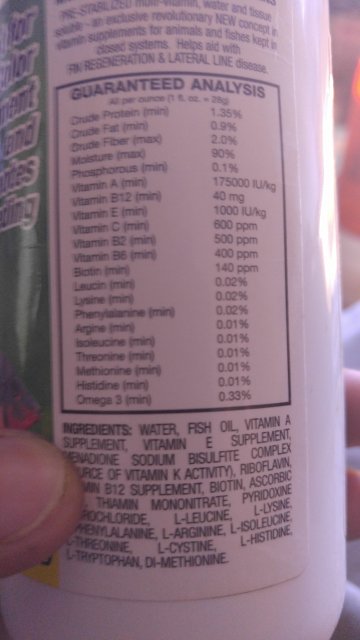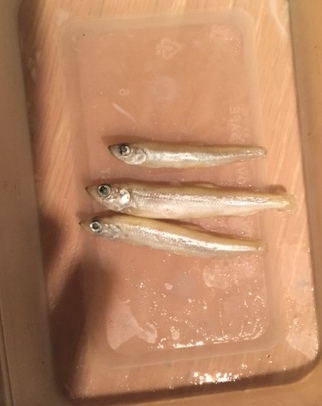Now that is interesting as I know of a few people who have fed goldfish to volitan lionfish almost exclusively for years.I use silversides.. and a big bd breeder in NY uses almost only silversides and his rays are over ten years old. I asked Dr. Paul Loiselle about this topic and he told me that you can not feed freshwater fish to saltwater fish but the opposite is fine.
Salt water fish as food
- Thread starter Yoda1
- Start date
You are using an out of date browser. It may not display this or other websites correctly.
You should upgrade or use an alternative browser.
You should upgrade or use an alternative browser.
Sounds familiar. I had a shoal of 10 that all went into the death roll (panic attack). I believe DBjunkie experienced the same.A few years ago I heavily fed my first two armatus smelt and they both died after a few months.I fed my third armatus very few smelts and it lived for a few years before succumbing to complications from a panic attack.
I think something spooked mine as I was upstairs when I heard a loud and sudden bang.I ran to the basement the glass tops were knocked off the tank and my two foot armatus was nearly halfway across the room and flapping about on the floor.Sounds familiar. I had a shoal of 10 that all went into the death roll (panic attack). I believe DBjunkie experienced the same.
This is something that I wondered about a lot when feeding my own Rays and fish, however I believe that most fish whether saltwater or fresh water have similar salt/ sodium chloride levels.
If the salt levels were vastly different the internal processes like osmosis within the cells and kidneys wouldn’t function correctly.
The way Marine fish remove the excess salt is through their kidneys and cells within their gills, then expell it in its urine.
Sharks and Rays however use Urea to balance ions internally so don’t have the same issues with osmosis, our freshwater Rays still have this biology therefore produce a lot more ammonia that regular freshwater fish.
(Hence the large water changes J)
I guess like previously mentioned the risk of disease and that kind of related issues are reduced also when feeding saltwater fish.
If the salt levels were vastly different the internal processes like osmosis within the cells and kidneys wouldn’t function correctly.
The way Marine fish remove the excess salt is through their kidneys and cells within their gills, then expell it in its urine.
Sharks and Rays however use Urea to balance ions internally so don’t have the same issues with osmosis, our freshwater Rays still have this biology therefore produce a lot more ammonia that regular freshwater fish.
(Hence the large water changes J)
I guess like previously mentioned the risk of disease and that kind of related issues are reduced also when feeding saltwater fish.
It's the Thiaminaise that is the concern which smelt and shrimp both contain. The longer it's been frozen before feeding the more Thiaminaise. Thiaminase inhibits b1(thiamine) synthesis. A thiamine deficient fish can have many health effects, the lake trout in the great lakes are having fertility issues because their diet is now largely compromised of invasive alewives which are high in Thiaminase. To combat this you need to limit Thiaminase ingestion or supplement b1 thiamine.
Try cutting your smelt and soaking them in vita chem for 20 minutes before feeding.
Long term solution get them pellet trained and rotate foods. Chop up earthworms in a cup, add a few teaspoons of water. Remove earthworms. Soak massivore in worm blood water for 20 minutes until saturated. Feed. Repeat. Eventually they Will take the pellets and you can use less worm blood to scent the pellets.
oddball has a list anywhere on here with fish species that contain Thiaminase. Some are freshwater and Some are saltwater. I'll look for it.
Try cutting your smelt and soaking them in vita chem for 20 minutes before feeding.
Long term solution get them pellet trained and rotate foods. Chop up earthworms in a cup, add a few teaspoons of water. Remove earthworms. Soak massivore in worm blood water for 20 minutes until saturated. Feed. Repeat. Eventually they Will take the pellets and you can use less worm blood to scent the pellets.
oddball has a list anywhere on here with fish species that contain Thiaminase. Some are freshwater and Some are saltwater. I'll look for it.




